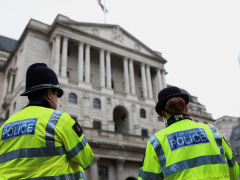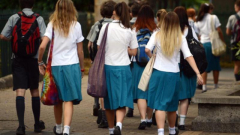Last month, a British journalist revealed that she had been visited by police at her Essex home over a post she wrote relating to Pakistan’s former Prime Minister Imran Khan, on X a year earlier.
On November 12, Allison Pearson, a columnist for the right-wing newspaper, The Daily Telegraph, claimed she was being investigated for a “non-crime hate incident” (NCHI). The police later disputed this, saying she was being investigated for a potential criminal offence of stirring up racial hatred, rather than an NCHI, but in any case, the probe was dropped a few days later.
Whether the police were investigating Pearson for a non-crime hate incident or, indeed, for a criminal offence, the row over her experience has brought discussions about the contentious practice of recording NCHIs to the fore.
This week, Nick Herbert, the chairman of the College of Policing, said the government should consider scrapping NCHIs altogether, and claimed the recording of NCHIs has become an “impediment to the police”.
While some want the practice scrapped, however, others assert that recording NCHIs is important.
But what is a “non-crime” hate incident and what do people in the United Kingdom think about the police investigating them?
What are non-crime hate incidents?
The Police, Crime, Sentencing and Courts Act 2022, which applies to England and Wales, describes an NCHI as an action which is “clearly motivated by intentional hostility or prejudice towards people with a particular characteristic”.
These characteristics could be race, religion, sexuality, disability or transgender identity.
The West Yorkshire Police website lists examples of NCHIs which include verbal or online harassment, bullying in the school or the workplace, offensive leaflets or posters and dumping of rubbish outside homes or through letterboxes.
Police in England and Wales have been required by law to record reports of NCHIs since June 2023.
Scotland implemented its own hate crime law – the Hate Crime and Public Order (Scotland) Act – in April 2024. This also mentions NCHIs: “It is an operational matter for Police Scotland to determine how reports of a hate crime or hate incident are investigated and recorded and these are not in any way related to the Hate Crime Act.”
Why do people say police recording NCHIs is problematic?
Some argue that NCHIs curtail freedom of speech, waste police time and are targeting people who should not be on the police radar.
Last month, The Times newspaper revealed its own investigation, which found that a nine-year-old who called a classmate a “retard” and two secondary school pupils who said another pupil “smelled like fish” had been logged by police as having committed NCHIs.
Other children had also been reported – and their actions recorded by police – The Times investigation found. The Times said it uncovered “widespread confusion” among police over what types of incidents should be recorded.
Complaints of NCHIs have increased recently. Based on data from 45 of the UK’s 48 police forces, 13,200 complaints were recorded over the last year. Based on this number of complaints, UK think tank Policy Exchange projected in a report published on November 25, that more than 60,000 police hours per annum were spent on NCHIs.
Nick Herbert, the chairman of the College of Policing, told the media this week: “I think it has become an impediment to the police doing what we want the police to do, which is ensure that they are preventing harm, identifying where there is risk of harm, ensuring that it can be prevented … the category itself has become controversial and a distraction.”
Why do some people say they are necessary?
Some argue that monitoring NCHIs is necessary because they can be indicative of hateful behaviour that may escalate into crimin





